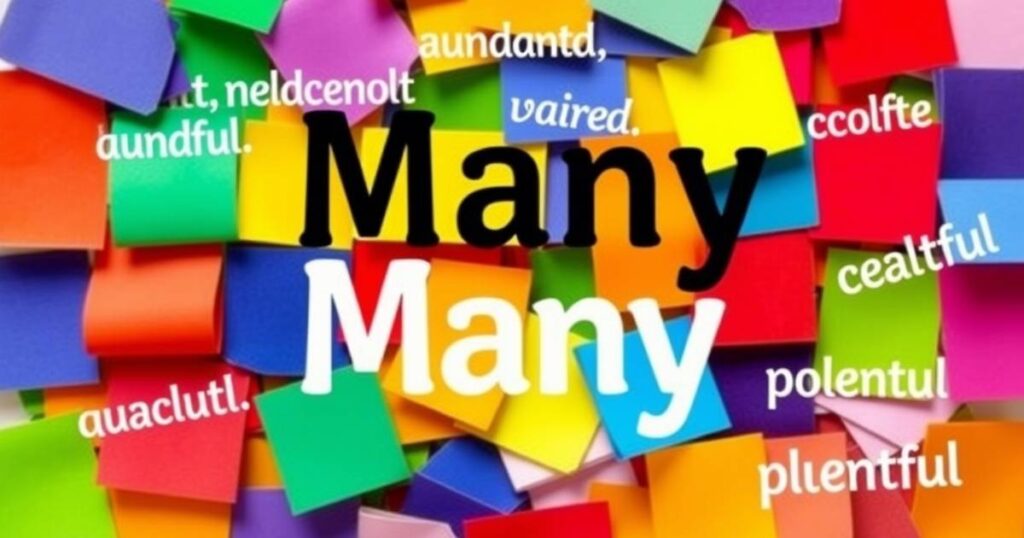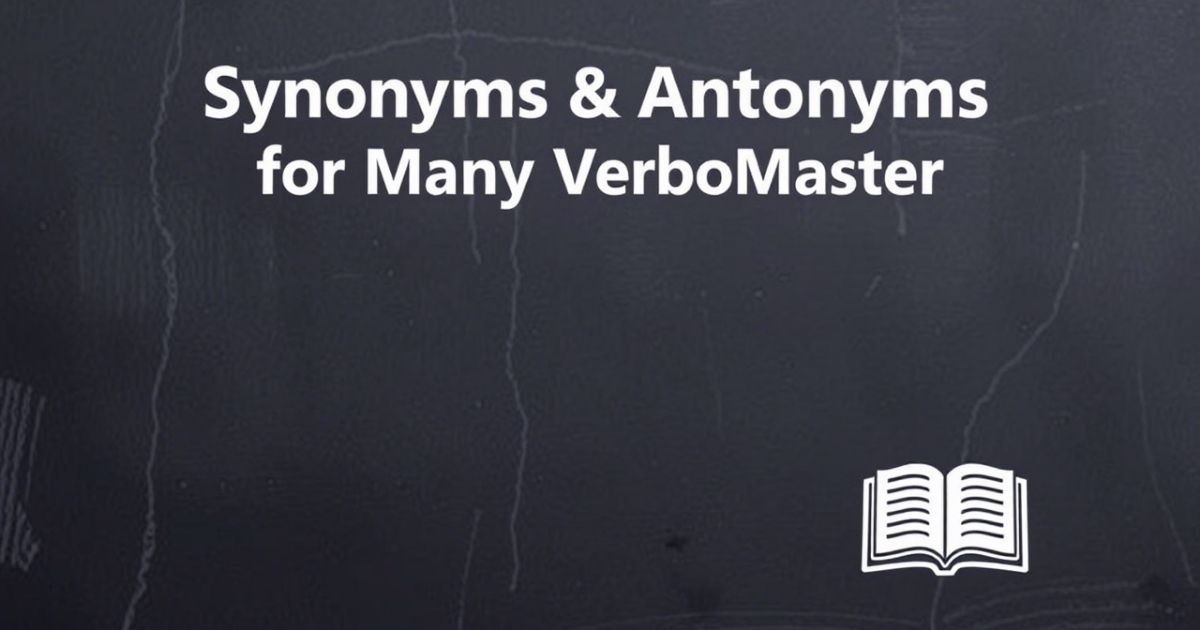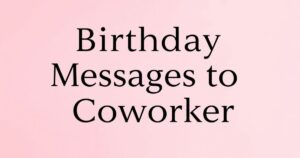Want to speak and write more powerfully? Synonyms & Antonyms for Many can help you do just that! These simple language tools let you express yourself more clearly and creatively. By knowing the Synonyms & Antonyms for Many, you can spice up your conversations and writing. Synonyms are words that share the same meaning, like “numerous” for “many,” while antonyms show the opposite, like “few.”
Mastering Synonyms & Antonyms for Many is a game-changer for your vocabulary. It allows you to choose the perfect word for any situation. Whether you’re chatting casually or writing formally, understanding Synonyms Antonyms for Many helps you communicate with confidence and precision. It’s a straightforward yet powerful way to improve your language skills. Ready to boost your communication? Let’s dive into the world of Synonyms Antonyms for Many!
What Does Many Mean?
“Many” is a simple word, but it packs a punch when we want to talk about a large number of things.
For example:
“There are many stars in the sky.”
However, using “many” too often can make your writing feel repetitive. That’s where synonyms come in! Words like “numerous,” “countless,” and “several” can spice things up, offering variety and making your writing more interesting. By using different synonyms, you can add depth and keep your language fresh.
Definition of Many
“Many” is an adjective that refers to a large number of countable items. It highlights abundance without specifying an exact quantity. For example, “many apples” or “many people” suggests a significant number of things or individuals, though not necessarily a specific count.
Overusing the word “many” can make writing feel repetitive. To keep your language fresh, you can use synonyms like “numerous,” “countless,” or “several.” These alternatives add variety, making your writing more engaging and descriptive while maintaining clarity about the quantity being discussed.
Why Not Just Say Many?
Saying “many” is perfectly fine, but using it too often can make your writing feel repetitive and less engaging. Repeating the same word can limit your language’s variety and creativity.
By using synonyms for “many,” like “numerous,” “countless,” or “several,” you can add richness and context to your writing. These alternatives make your language more interesting and help avoid monotony. Choosing different words also allows you to better match the tone and style of your work, whether casual or formal.
Synonyms for Many: Add Some Color to Your Words!

Using the word “many” over and over can make your writing feel plain. Try switching it up with colorful synonyms. These alternatives help you sound more natural in everyday conversations, formal writing, and even creative storytelling. Let’s dive in!
| Word | Meaning | Example | Best For |
| Numerous | A large number | She received numerous letters. | Formal writing |
| Countless | Too many to count | He made countless attempts. | Poetic expressions |
| Several | More than a few | Several students joined the club. | Everyday conversations |
| A lot of | A large amount | A lot of people liked the post. | Informal tone |
| Plenty | More than enough | We have plenty of time. | Casual speech |
| Abundant | Present in large amounts | The garden had abundant flowers. | Descriptive writing |
| Scores of | Large groups of | Scores of fans cheered loudly. | Dramatic expressions |
| Heaps of | Large piles or amounts | She has heaps of homework. | Informal speech |
| Loads of | A lot of something | We’ve got loads of snacks. | Casual tones |
| Dozens of | Many in groups of twelve | Dozens of cookies were baked. | Informal tone |
| Tons of | Very large amount | He has tons of energy. | Informal conversations |
| Masses of | Great quantity | Masses of tourists visit yearly. | Journalistic writing |
| Ample | Enough or more than enough | She had ample reasons to quit. | Formal writing |
| Myriad | Countless or extremely large number | Myriad stars filled the sky. | Poetic contexts |
| Legion | Great in number | He had a legion of followers. | Literary texts |
| Galore | In abundance | There were prizes galore! | Informal speech |
| Overflowing | Too full | The basket was overflowing with gifts. | Descriptive writing |
| Teeming | Full of or swarming with | The lake was teeming with fish. | Narrative writing |
| Reams of | A large quantity | She wrote reams of notes. | Academic writing |
| Zillions | Extremely large number (informal) | Zillions of stars out tonight. | Casual speech |
| Hoards | Stored in large amounts | He had hoards of old toys. | Fiction |
| Truckload | A large quantity (informal) | She got a truckload of gifts. | Social media posts |
| Infinite | Without end or limit | He had infinite ideas. | Philosophical contexts |
| Substantial | Considerable in amount | A substantial number agreed. | Academic use |
| High volume | Large quantity | The site sees high volume traffic. | Technical contexts |
| Bunch of | A group or lot of | A bunch of kids were playing. | Informal conversations |
| Slew of | A large number | A slew of changes were announced. | Professional contexts |
| Copious | Abundant in supply | She took copious notes. | Academic writing |
| Piles of | Stacked in quantity | There were piles of clothes. | Everyday conversations |
| Vast | Huge in size or number | A vast number of stars. | Poetic or dramatic writing |
Antonyms for Many: When There’s Only a Few
Sometimes, we need to describe small numbers. That’s where antonyms for “many” come in. Words like “few,” “scattered,” or “limited” help make our meaning clear when there aren’t a lot of things to count.
| Word | Meaning | Example | Best For |
| Few | A small number | Few people showed up to the party. | Everyday conversations |
| Scattered | Spread out sparsely | Scattered houses dotted the hillside. | Descriptive writing |
| Limited | Not much available | Tickets are limited this year. | Professional writing |
| Rare | Not common | Rare birds live in this forest. | Academic writing |
| Sparse | Thinly spread | The forest was sparse and dry. | Poetic expressions |
| Slight | Very small in amount | There’s a slight chance of rain. | Formal writing |
| Little | Small in size or amount | We have little time left. | Informal tone |
| Handful | A small number or amount | Only a handful of kids joined. | Casual speech |
| Meager | Lacking in quantity or quality | They survived on meager supplies. | Historical contexts |
| Minor | Not significant or large | There were minor changes made. | Academic use |
| Insufficient | Not enough | The funds were insufficient. | Technical contexts |
| Rarely | Not often | He rarely makes mistakes. | Journalistic writing |
| Shortage | Not enough of something | A water shortage hit the area. | News or reports |
| Minimal | Very small in amount | She made minimal effort. | Professional contexts |
| Occasional | Happening sometimes | Occasional calls came through. | Literature |
Using Synonyms and Antonyms for Many in Everyday Life
Synonyms for “many” like numerous, several, or countless can make conversations and writing feel more natural and vivid. They help express variety in casual speech and formal communication.
Antonyms like few, limited, or scattered are useful when describing smaller amounts. Whether you’re writing a message, giving a speech, or telling a story, these words bring accuracy and style.
Related Guide:
Words Ending With B: List, Meaning & Examples
Examples from Books and Articles
Writers use synonyms and antonyms for “many” to add clarity, tone, and variety in fiction, journalism, and academic writing.
- Moby-Dick by Herman Melville: “Numerous sailors stood on deck, scanning the sea for signs of the great white whale’s return.”
- A news article: “Few witnesses came forward, making it difficult for authorities to gather strong evidence after the incident downtown.”
- A history book: “Several nations joined the alliance, hoping their combined efforts would shift the course of the war.”
- A novel excerpt: “Countless stars lit the sky, each one flickering like a distant memory above the quiet mountain town.”
- Academic essay: “Limited research has been conducted on this rare species, leaving gaps in the field’s overall understanding and data.”
Synonyms & Antonyms for Many as a Noun
Most people know many as a determiner (like in many people), but did you know it can also be used as a noun? In this form, many stands for a large group, either of people or things, and often appears in more formal, poetic, or philosophical contexts.
When used as a noun, many becomes a powerful way to describe a crowd or majority without listing individuals. It adds emphasis, abstraction, and a touch of sophistication to your sentence.
Examples of Many as a Noun
- People in a group:
The many who stood in line waited for hours.
(“The many” replaces the crowd, offering a literary feel.) - In speeches or writing:
He worked tirelessly to serve the many, not the privileged few.
(This shows a contrast between the general population and a smaller elite.) - In historical writing:
Throughout history, the many have struggled under the rule of the few.
(Common in philosophical or academic writing.) - Philosophical contexts:
Plato often spoke of the many as those governed by reason.
(Used to describe the general public.) - Literary style:
Voices rose from the many, demanding change and justice.
(Adds drama and emotional depth.)
Using Synonyms & Antonyms for Many this way enriches your language style, especially in literature, public speaking, and philosophy. It’s a smart technique for vocabulary building and giving your writing a more polished tone.
Synonyms & Antonyms for Many as a Verb
While many isn’t normally used as a verb in standard English, some writers and speakers get playful with it. In casual speech or creative writing, it might sneak into verb-like phrases, especially in a fun or poetic way.
It’s rare, non-standard, and definitely informal, but that’s what makes it interesting.
Creative Use of Many as a Verb
To stretch or exaggerate amounts:
- “Don’t tell the story just to impress them.”
- “He always manages the number of people who show up.”
These phrases suggest someone is adding extra numbers or drama.
In poetic or expressive writing:
- “She manied the room with laughter and cheer.”
- “They manied their worries into a sea of thoughts.”
Writers sometimes use “many” as a verb to show multiplying feelings or effects.
Though not correct in formal writing, these uses show how language lovers bend the rules for fun and emotion. Just be sure your reader gets the tone!
Why Using Different Words for Many is Important
Wondering why it matters? Here’s why using different words for many is a smart move:
- It Makes Your Language Livelier: Using new words adds flavor and keeps things from sounding boring.
- It Shows You Know Your Stuff: Picking the right word at the right time makes you sound clear and confident.
- It Boosts Your Word Power: Growing your vocabulary feels good, and makes talking and writing way more fun!
Swapping out “many” now and then keeps your message strong, fresh, and interesting for everyone listening or reading.
How to Say It Right
I remember one of my friends asking, “Is it ‘MAY-nee’ or ‘MAH-nee’?” Let’s clear that up:
Say it like MAY-nee (rhymes with say-nee)
A quick tip: If you’re telling a story or reading aloud, think of “Many” like the start of “many thanks.”
The Many Uses of ‘Many’
When You’re Being Formal
Picture yourself at a meeting or writing a business email. These alternatives will add some polish to your language:
- Numerous (perfect for formal reports)
- Multiple (great for scientific contexts)
- Various (ideal when discussing different kinds)
- Abundant (use when there’s plenty of something)
- Myriad (sounds sophisticated and elegant)
These words will make your communication sound sharp and professional!
When You’re Chatting with Friends
When you’re chatting with friends, it’s all about keeping things light and easy. Words like “loads,” “heaps,” “tons,” and “oodles” are perfect for casual conversations. These fun alternatives make your speech sound relaxed and more relatable to those around you.
For Different Situations:
Just like you wouldn’t wear flip-flops to a formal event, choose the right word for the right moment:
For School Papers:
- Substantial
- Considerable
- Extensive
- Countless
- Manifold
For Creative Writing:
- Legion (perfect for epic tales)
- Infinite (when exaggeration is key)
- Profuse (great for nature descriptions)
- Multitudinous (a Shakespeare favorite!)
- Copious (sounds high-brow and fancy)
The Opposite Word of Synonyms & Antonyms for Many
Sometimes, instead of talking about “many,” we need to focus on smaller quantities. Here are some of the best ways to express “not many”:
- Few (the go-to word when you want to keep it simple)
- Limited (perfect for formal situations, especially in business or academic writing)
- Scarce (use this when something is rare or hard to find)
- Minimal (a professional-sounding option, ideal for reports or presentations)
- A handful (a casual, easy way to say there aren’t many of something)
Each of these words is useful for describing situations with fewer things or people. Depending on the context, you can choose the word that best fits the tone of your conversation or writing. Whether you’re in a formal discussion, an academic paper, or just chatting with friends, knowing how to express “not many” opens up a world of variety and precision in your language!
A Little Word History of The Word Synonyms & Antonyms for Many
Here’s a fun fact, the word many has been around for over 1,000 years! My students always find it amazing that our great-great-great (and many more greats) ancestors used this exact word. It originates from Old English, where it also meant “many.” This long history shows just how deeply rooted the word is in our language. Interestingly, German speakers might notice a connection, as their word Manch shares a similar meaning.
Over time, Synonyms & Antonyms for Many have evolved, but many has stayed remarkably consistent in both spelling and meaning, unlike some other words that have changed dramatically. It’s fascinating to think about how a simple word like many has traveled through centuries, connecting us to speakers from centuries ago. So, next time you use the word, remember, you’re speaking the same language as people who lived over a millennium ago!
Tips for Remembering New Words

Now that you’ve learned some great synonyms and antonyms for many, how can you keep them in your memory? Here are some fun and easy tips:
Use Flashcards: Write the word on one side and its meaning on the other. This makes review quick and easy.
Practice in Sentences: Try using the new words in sentences. The more you use them, the more they’ll stick in your mind.
Play Word Games: Word games like Scrabble or Boggle are a fun way to spot synonyms and antonyms while expanding your vocabulary.
Teach Someone Else: Explaining the words to a friend or family member is a great way to solidify your understanding.
Create Associations: Connect new words to something familiar in your life. Associating words with images or experiences makes them easier to remember.
By using these tips, you’ll not only remember your new words, but you’ll also be able to use them confidently in conversation and writing!
- Use Flashcards for quick review.
- Practice in Sentences to reinforce learning.
- Play Word Games to expand vocabulary.
- Teach Someone Else to solidify understanding.
- Create Associations to make words stick.
Quick Recap
We’ve explored a lot about the word many today! From its synonyms to antonyms, here’s what you’ve learned:
- Synonyms for Many add variety and flair to your language, making communication more interesting and engaging.
- Antonyms for Many help you express the opposite, like “few” or “limited,” depending on the context.
- Using these words in everyday speech makes you sound more knowledgeable and creative, whether you’re chatting with friends or writing formal papers.
- Remembering these words is easy with tips like using flashcards, practicing in sentences, and playing word games.
By expanding your vocabulary, you can communicate more precisely and confidently, whether it’s in casual conversations or formal settings!
FAQ’s
What are the synonyms and antonyms of many?
Synonyms & Antonyms for Many include “numerous,” “countless,” and “various” as synonyms. Antonyms would be “few,” “limited,” and “scarce.”
What is the opposite of many?
The opposite of many, according to Synonyms & Antonyms for Many, is “few” or “a small number.” It refers to a limited quantity.
What are synonyms for so many?
Synonyms & Antonyms for Many show that “so many” can be replaced with “countless,” “a lot of,” or “numerous,” emphasizing a large quantity.
What are many synonyms?
As Synonyms & Antonyms for Many explain, synonyms for “many” include “numerous,” “several,” and “varied.” These words suggest a large or diverse number of things.
What are synonyms and antonyms?
Synonyms & Antonyms for Many refer to words with similar meanings (synonyms) or opposite meanings (antonyms). They help diversify and clarify language use in speech and writing.
Conclusion
To sum up, learning Synonyms & Antonyms for Many is an easy way to improve your language skills. Knowing Synonyms Antonyms for Many helps you find the right words for different situations. It makes your speech and writing more colorful and clear. Whether you are speaking casually or writing formally, understanding Synonyms & Antonyms for Many is a valuable skill.
The more you practice with Synonyms & Antonyms for Many, the better your vocabulary will become. You can express yourself with more variety and precision. Synonyms Antonyms for Many help you avoid repetition and add depth to your language. Keep using and exploring Synonyms & Antonyms for Many to improve your communication. With just a little effort, you can easily expand your language skills and become more confident in both speaking and writing.

Atlas Reid is an experienced administrator with 5 years of expertise in managing operations, streamlining processes, and ensuring efficiency. Skilled in leadership, organization, and problem-solving to drive business success.








